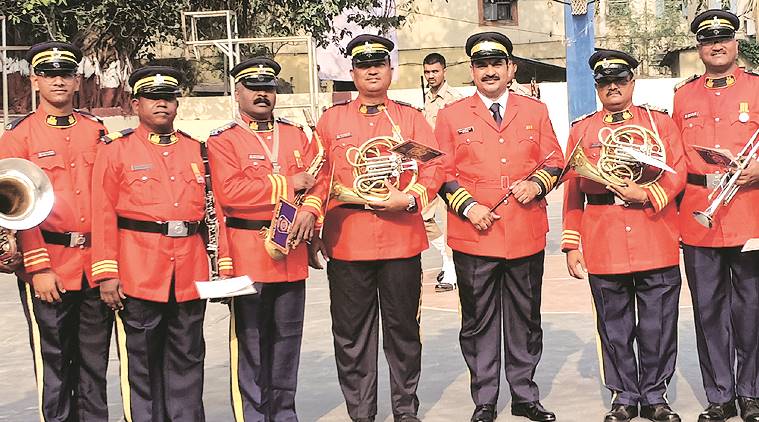
Inspector Sanjay Kalyani remembers the first time he played with the Mumbai Police band at the Gateway of India last year. It was the Police Commemoration Day in October and the band was to be part of a flash mob at the iconic monument.
“The large crowd made me nervous. I had marched at the Gateway many times before, but never played there. I had only taken over the band a few days before and hadn’t practised as much with everyone. So, I wasn’t sure how it would go,” he recalls.
It is with performances such as these that the Mumbai Police band has really established itself in the city as a musical institution in its eight-decade existence. The story, according to police historian Rohidas Dusar, goes that during a parade held in the presence of the then governor, Lord Brabourne, at the city’s police headquarters in Naigaon, Parel, in 1935 to mark the Silver Jubilee Year of the British Empire, something was visibly missing: specifically a band to belt out a rousing marching tune.
But the government’s tight purse strings meant that it was left to local residents to raise money to buy the instruments. The band was officially introduced to the city in April 1936 at a parade to welcome the then newly-appointed Viceroy of India, Lord Linlithgow, to Bombay, writes Dusar.
With 12 bandmasters to date, of whom Kalyani is the latest, the police has often looked to the armed forces to find leaders. Kalyani himself retired from the Indian Navy in 2012 as a petty officer after a 15-year career.
The 39-year-old began playing the harmonium as a teenager in Pune before enlisting in the Navy after Class 12. “I had planned on studying engineering, but one day I saw a poster advertising vacancies for musicians in the Navy and decided to apply,” he says.
In the Navy’s School of Music, Kalyani mastered the tuba, the euphonium and the trombone, before being selected to undergo the ‘Musicians 1st Class Course’ at the Royal Marine School of Music in Portsmouth, UK, in 2003. Over four rigorous months, Kalyani learnt history, harmony, instruments, conducting and marching. It culminated in an exam inside a cathedral where Kalyani was required to present two pieces – one of which was an original composition.
“That’s where I got the inspiration to become a bandmaster,” he says. Within a year of returning to India, Kalyani was appointed chief instructor at the School of Music on INS Kunjali, the Navy’s base in Colaba. Alongside, Kalyani also acquired a degree in music from the London College of Music.
After leaving the Navy, Kalyani joined an international school in Pune as a music teacher. “Teaching in the school was completely different. I had to find creative ways to teach children how to read notes and play instruments. It was different from teaching in the Navy,” he says.
When the vacancy in the Mumbai Police opened up last year, Kalyani knew he had to go for it. “The Mumbai Police band is historic and being its bandmaster is an extremely coveted position,” he adds.
The band’s 120 members, comprising pipe, brass and bugle sections, practise twice a day and play the parade every Friday morning.
“The band sets the tone during a parade. Songs that we play help our men and women march aggressively. So, there is no margin for error,” Kalyani explains.
The band is also in demand to play at weddings, both of civilians and police officers. “There is hardly a day that goes by without a booking for an event,” he says.
Most importantly, the band is also the most prominent feature of a welcoming ceremony for foreign dignitaries visiting the Maharashtra Governor at Raj Bhavan.
The prestige of playing for VIPs aside, it is adulation from the public that the band treasures. “After our performance at the Gateway of India last year, a lot of people tweeted to the police saying how much they enjoyed watching us play. The band is an ambassador of the police and also a means for the public to interact with the police,” he says.